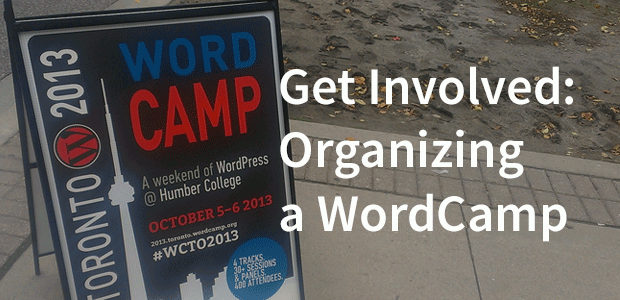
Yesterday I put together a big list of the different things you should consider when running a WordPress meetup. Over the next couple of weeks I’d like to tackle a bigger fish: WordCamps! (But in much smaller bites than yesterday’s beefy post.)
This series is a combination of my thoughts and experiences from helping organize Toronto’s last four WordCamps. Different organizers — even in our own team — have different opinions and perspectives about how things are done.
Let’s get started. 🙂
Before You Begin…
My words of advice to anyone who is thinking about organizing a WordCamp for the first time:
Read everything on the WordCamp Planning site. There’s tons of useful information there. If you have questions, go and post in the forums.
WordCamps are what you make of them. While many cities (including our own) run conference-esque events, they don’t need to be this way. If you want to do something different, go for it.
WordCamps are not franchises. Learning from other events is one thing, but making a carbon-copy duplicate is boring.
WordCamps are local. With every presentation (ideally) going up on WordPress.tv, you’re going to see a lot of redundancy between talks. Your location, and the people in it, are one thing you have that nobody else does. Take advantage of that! Show some hometown pride by featuring local talent and projects.
When things get stressful, remember: it’s only a WordCamp. You’re not organizing an industry conference or tradeshow. If things get too dramatic (it happens), just take a deep breath and remember: it’s only a WordCamp. Focus on why you’re doing it (WordPress <3) and work towards making it an awesome WordPress event for your attendees.
Be able to meet with your organizing team regularly. I can’t stress this enough. Face-to-face discussions are sooo important. If you can’t get everyone in one place at one time, hold a video chat. You need that eye contact! Tone is very difficult to interpret via written text, and — in my opinion — voice alone isn’t much better.
Respect timelines and work towards getting things done. For larger teams, decisions may get made by some when everyone isn’t available. More often than not this is done purely for the sake of getting things done. Timelines are important in big projects, especially when you’re only working on them in your downtime, as you usually are with a WordCamp.
Prepare for a mix of exhilaration and exhaustion. Organizing a WordCamp is a very big undertaking, eating up many many hours, especially as you get closer to the day of the event. But it’s also very rewarding. You get a special feeling when you see so many people come together to geek out about something you share an interest in.
It’s okay if you get infected with the WordCamp bug. WordCamp Toronto 2011 was my first. Now I’m hooked! In addition to co-organizing WordCamps, I’ve also been volunteering at other tech conferences and events. Who knows? You might catch it, too… and that’s alright. 🙂
The Setup
There are 15 different aspects to a WordCamp, each of which is covered on the WordCamp Planning site and in the WordCamp Planning forums. I’ll be covering each of these in a separate post:
- The Organizing Team
- Choosing a Date
- Choosing a Venue
- Food/Beverage
- WordCamp.org Websites
- Speakers & Presentations
- Sponsorship
- Spreading the Word
- Registration
- A/V and Videography
- Volunteer Wrangling
- Day Of…
- When It’s All Over
*Links will be added as posts are completed. 🙂
Organizing (or interested in organizing) a WordCamp for your area? Drop a message in the comments!
